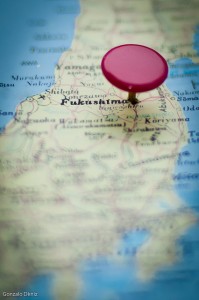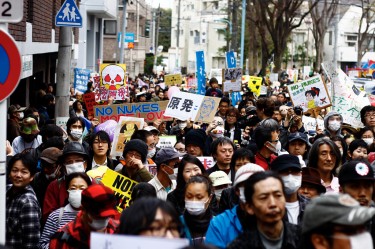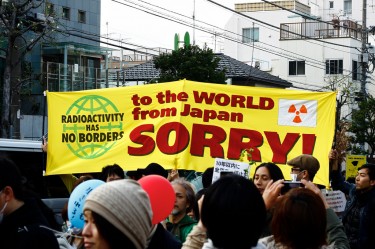This post is part of our special coverage Japan Earthquake 2011.
The recent escalation by the Government of the crisis at the Fukushima power plant from a category five to category seven, the highest level, now puts it on a par with the disastrous accident at the Chernobyl power plant in Russia in 1986. Even as a category five disaster it had prompted an unprecedented outpouring of public criticism in Japanese society.
Open protests against Tepco as operator and the government as monitor had been relatively muted until recently, but this has now changed. Tepco was responsible for the placement and maintenance of obsolete structures and for failing to ensure adequate safety measures and backup systems that would have guaranteed a working cooling system despite the strong quakes and tsunami. Governments, both past and present are seen as complicit for their inadequate supervision and inspections of the facility as well as for the recent extension of Tepco's operating permit.
On April 10, 2011, more than 15,000 people gathered in Tokyo streets to protest against the nuclear power industry and the problems it had caused. In a city with over 13 million people this might seem like a very small number but it was the first time that ordinary people had taken to the streets to voice their opposition to nuclear power. As further proof of the widespread anger another 10,000 people followed the protest on Ustream thanks to Yasumi Iwakami’s team who broadcast the event live.
Reluctance to criticize?
For many foreigners however, used to much bigger numbers of demonstrators in their own countries, doubts remain. Why do Japanese people seem so reluctant to criticize the company and industry responsible for this man made disaster and the government which let it all happen?
A recent discussion appearing on Twitter shows that a lack of open protest does not mean that the Japanese people have not been questioning or complaining of the actions of the authorities as some foreigners have implied.
The following thread originated from a foreigner's doubt that was expressed to user @SaveJPN:
z_kakiya: RT @SaveJPN: とても深い。深くて悔しい。->「今日、外国の記者に『大地震の直後であっても礼儀や秩序を守る姿に世界中が感銘をうけて称賛したが、いま人災を撒 き散らす政府に抗議の声もあげない日本人に世界は冷ややかな目を向けている。彼らはただ集団行動をしただけだ』といわれた」
Reflecting on the foreigner's words, some readers began to wonder whether, for the Japanese, it's deemed more socially appropriate not to raise voices in complaint when something goes wrong.
@Arugha_Satoru: @z_kakiya ハハハ。サーセン。マジレスすると政府に文句言ってる関係がどうにもアレなひとたちばかりなので、黙っている方がマトモに見えてしまう的なあれとかもあるのかも知れないですが。
@z_kakiya: @Arugha_Satoru んですよね……。 直接抗議がスタンダードから遠いからなあ……。 実際非常に厳しいですしね……。
However, Inuinu_void questioned this, blaming the Japanese media who have been covering up Tepco's faults as it is one of the major sponsors of many television shows.
@Inuinu_void: はっ きり言うけどさ、日本人は怒るべきだと言ってもどう怒りを表明しろと言うんだい。 表明したところでマ スコミは東電の味方でろくずっぽ報道しないし、運動していそうな連中はプロ市民ときている。 いま日本人の怒りというのはマグマのように水面下で蠢いてい る。それに気づくのか?外国人は。
Attempting an interpretation of the Japanese mentality in such a situation, Arugha_Satoru says the lack of protest might be due to a general desire not to spark panic that might hinder those who are trying to manage the emergency.
@Arugha_Satoru: 東電とかに怒りをぶつけるヒマがあったら現地助けろよ! が日本人の大まかな(一般的な)共通見解なんじゃないのかな
@Arugha_Satoru: あとは「現地で略奪とかパニックになるくらいなら怒りはあっても今は我慢するべきだろ、別にそこまでグローバルスタンダードになる必要なし!」 かな。
Kenokabe says he doesn't agree with the ‘be quiet, you won't change the things anyway’ kind of thinking because only by voicing criticisms will problems be solved.
@kenokabe:「声をあげない」ことを美徳とする結果、横並び「和」を上等とするくせに「同調圧力」という横並びには嫌悪感がある。デモとか熱心にやってる人らをもう横目でニヤニヤするような空気はよくないとおもう。
@kenokabe: 以上踏まえてもっかい言うと、僕はこういうのはひとりひとりが「声をあげて」変えるしかないって立場だけど、他方「騒いだってどうにもならんで」っていうのはTLでよく見かける。どう思いますか?RT @Inuinu_void:
@kenokabe: そろそろ海外では僕等日本人総体に切れはじめてるようです。RT @ququri: 許したくない対象は東電や、現場の処置を不透明にしてしまっている不甲斐ない政府なのだけれど、それらてっぺんのどうしようも無い存在を今迄許してきた私にだって責任はあるのだ。だから、より、尚更、腹立たしい。
Besides the recent street protests in Tokyo, a wider section of the Japanese people have been reacting and showing appraisal for a song titled ‘It was a lie all along’ by singer Kazuyoshi Saito which has already recorded more than 491,000 views. The lyrics have been translated here.
http://www.youtube.com/watch?v=b01yohRgfyc
Textbooks and TV commercials said ‘it’s safe’
Deceived us, and their excuse is ‘unexpected’
Sweet memories of the sky, tickled by black rain
It was a lie all along
See, you got caught
It really was a lie
Nuclear power is safe
It was a lie all along
Wanna eat spinach
It was a lie all along
You knew about the situation right?
Can’t stop the radiation dancing in the wind now
After how many people are exposed will they finally realize – this country’s government
Found nice water away from this city?
Tell me about it
Actually, don’t. There’s no escape
It was a lie all along
Tokyo Electric, Hokuriku Electric, Chubu Electric, Kyushu Electric – no more dreams
It was all crap
But they’re still gonna carry on
It really was crap
Wanna do something with this feeling
It was a lie all along
It really was crap
This post is part of our special coverage Japan Earthquake 2011.










11 comments
I think besides this disaster catching everyone off guard (since many of Tokyo buildings are supposed to be earthquake proof) and this was a dual disaster, that the Japanese are a rock and a hard place when it comes to energy.
I am very anti nuclear for the obvious ongoing plant and waste dangers, and wisely for the planet they have not fully gone the coal burning path. As much manufacturing is done by third party countries, the industrial energy burden on this small island is also reduced. What I dont understand is why Japan has not taken the energy tech lead with sustainable energy systems such as solar (that currently the Germans have). Is it that with limited land they dont want their scenery spoiled by wind turbines and solar farms? Is this the conceit that has them have nuke plants so close to residential areas?
This may be a good time for them to put their surplus into R&D for renewable energies for their own sake and the world’s. this would really see Japan take moral leadership where it is needed and they seem to have been absent for so long. So clever with electronics but not solar or wind energy? why?